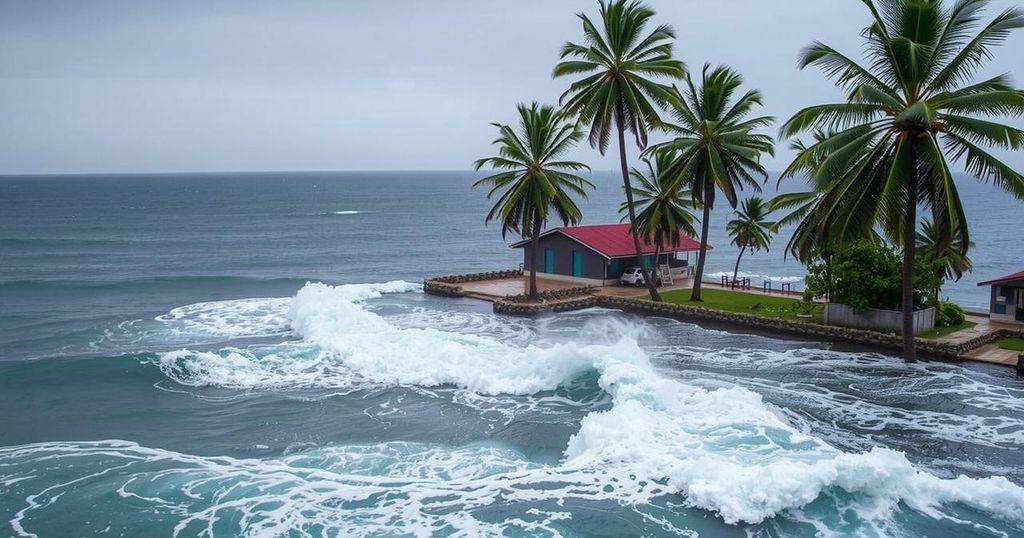Cyclone Chido’s Impact in Mozambique Raises Death Toll to 75

Cyclone Chido has claimed 75 lives in Mozambique, nearly twice the initial estimate, following severe destruction in Cabo Delgado province. This region was already in turmoil from an ongoing insurgency, complicating the disaster response. Damaged infrastructure and compounded humanitarian crises have rendered significant portions of the population extremely vulnerable.
The death toll from Cyclone Chido in Mozambique has tragically risen to 75, a nearly 100% increase from earlier reports, as rescue operations have gained access to previously unreachable areas. The cyclone impacted Cabo Delgado province, which was already grappling with an ongoing insurgency that has displaced hundreds of thousands. The destruction wrought by Cyclone Chido has resulted in at least 69 confirmed deaths and 740 injuries, according to the National Institute for Natural Disasters. Rescue efforts have faced significant challenges due to damaged infrastructure, particularly in the Mecufi district, where most structures have been obliterated. United Nations officials have described the aftermath as “utter destruction,” highlighting the extensive devastation of homes and medical facilities.
The nation of Mozambique, already classified as one of the poorest globally and particularly vulnerable to climate change, experiences frequent storms from the southern Indian Ocean. Following Cyclone Chido’s onslaught, numerous homes, especially mud and wooden structures, were destroyed, with essential facilities like health clinics suffering extensive damage. Pictures from the ground illustrate the chaos, with school materials among the ruins.
Prior to Cyclone Chido’s impact, Cabo Delgado had witnessed significant displacement due to violent insurgent attacks. The storm has exacerbated the dire conditions for approximately 10,000 individuals who were living in temporary shelters at the time of the cyclone. As articulated by United Nations officials, the ongoing cycles of conflict and climate volatility are contributing to a compounded humanitarian crisis for these affected communities.
Cyclone Chido, carrying sustained winds of approximately 115 miles per hour—equivalent to a Category 3 hurricane—also devastated the island of Mayotte, resulting in at least 31 fatalities there. Following its landfall in Mozambique, the cyclone decreased in intensity as it moved into Zimbabwe. The UN has warned that Cyclone Chido could herald a particularly severe rainy season, reminiscent of past cyclones that have historically caused extensive flooding in the region. In previous years, years like 2022 have seen major storms, such as Cyclone Freddy and Cyclone Gombe, claiming numerous lives in Mozambique and further displacing around 140,000 individuals due to extreme weather events.
Mozambique is a country extremely vulnerable to the effects of climate change and is often struck by severe weather events due to its geographical location. The nation has been grappling with a protracted conflict in Cabo Delgado province for several years, leading to large-scale displacement and humanitarian crises. Historically, Mozambique has faced repeated cyclonic disturbances, which exacerbate existing socio-economic challenges for its population, further compounding issues of poverty and lack of infrastructure. Cyclone Chido is one recent example of the intersection between environmental crises and socio-political strife in the region, necessitating urgent international attention and response to alleviate the ongoing suffering of affected populations.
In summary, Cyclone Chido has had catastrophic effects in Mozambique, resulting in a stark rise in deaths and extensive destruction, particularly in Cabo Delgado province, where a pre-existing humanitarian crisis due to conflict has worsened. The storm’s impact highlights the increasing frequency of severe weather events tied to climate change, underscoring the need for robust international support and innovative solutions to address both immediate humanitarian needs and long-term resilience strategies for vulnerable communities. As tragedies such as this unfold, they serve as a call to action for global solidarity and sustainable development initiatives.
Original Source: www.nytimes.com








